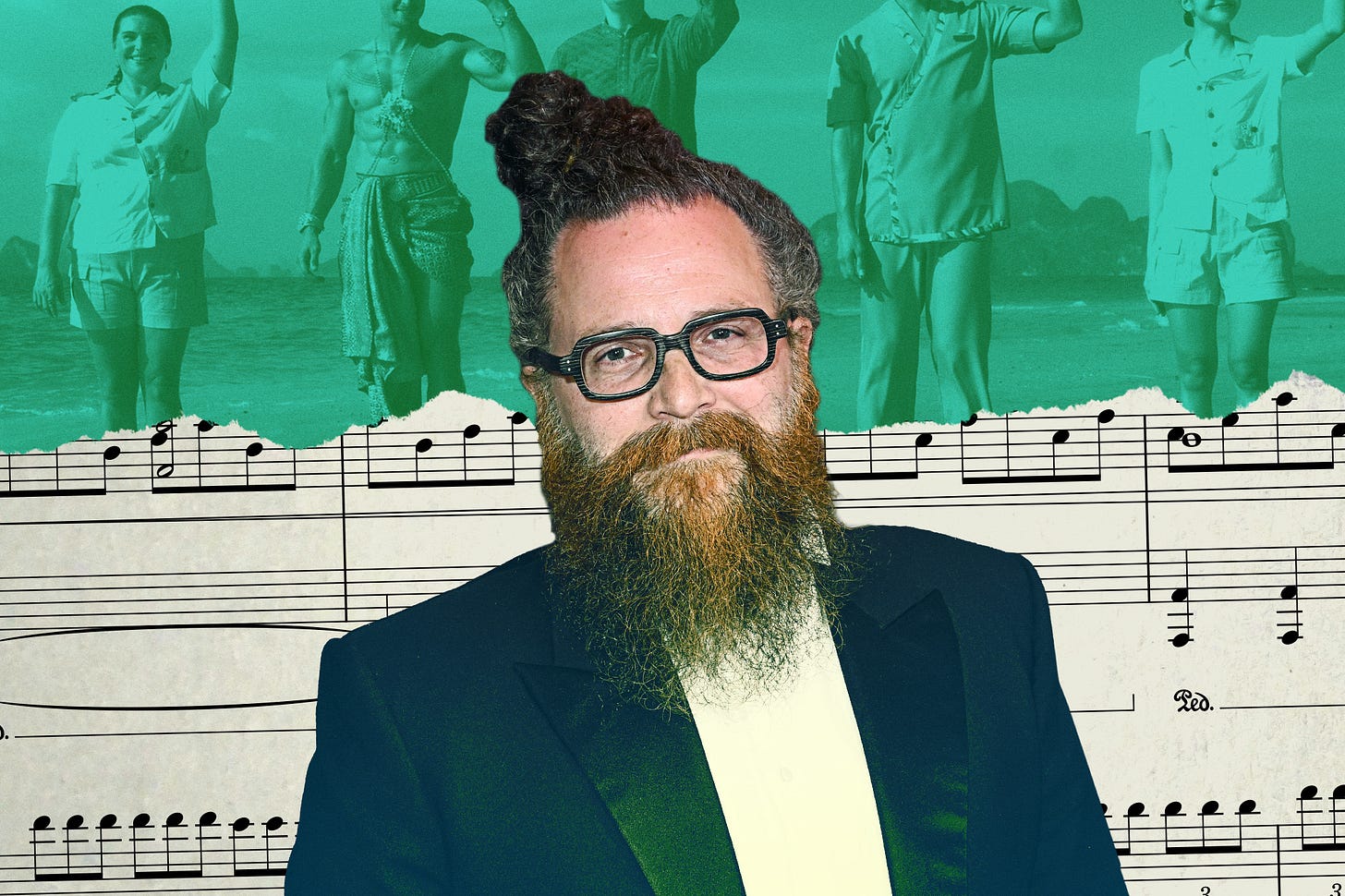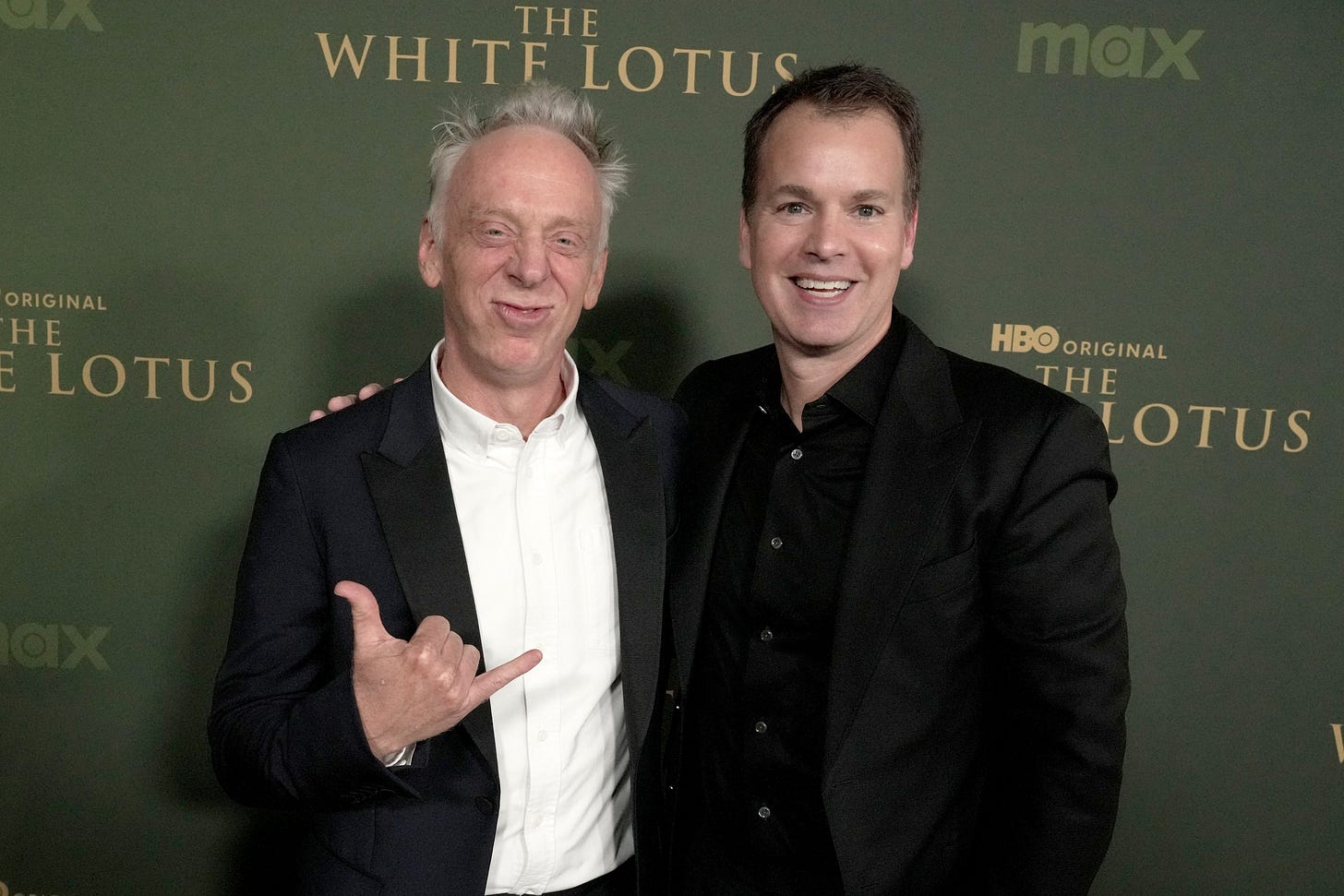'White Lotus' Composer: My Mike White Feud is 'a Very Dark Thing'
I talk to Cristobal Tapia de Veer about the hit score he believes was 'truly a gift' to the show's creator, his early 'Hawaiian Hitchcock' inspo and sharp words for HBO

Rob LeDonne interviewed every Oscar original song nominee this year, including the winning husband-wife duo behind the music of Emilia Pérez. He’s at rob@theankler.com
Welcome to my conversation about the music of The White Lotus with composer Cristobal Tapia de Veer! It’s been many weeks since I’ve seen you (this is my first Notable column since Oscar season), and I very much hope you enjoy your stay. Would you care for a bottle of water, or perhaps a couple lorazepam?
Before his very public war of words with White Lotus creator Mike White over the last few days, de Veer, 51, had enjoyed the spotlight on his work for the show, he tells me, even the loud audience complaints about season three’s theme. “It’s really amazing that people would give so much attention to details of the music,” he says. Throughout the run of HBO’s blockbuster hit, de Veer’s distinctive scoring has been just as integral to the show as its bingeable stories, picturesque scenery and the memorable stars who channel some of the most despicable — and also some of the most relatable — characters in TV.
Born in Chile before living in France and now Montreal, de Veer has constructed a unique musical voice, no doubt influenced by a dramatic upbringing and a fusion of disparate cultures (more on that later). Experiencing early success with his compositions for a string of popular U.K. series including Utopia and National Treasure, as well as a 2017 episode of Charlie Brooker’s Black Mirror, he’s also behind the adventurous scores for the Smile films and last year’s hyper-sexual Nicole Kidman starrer Babygirl.
But it’s his work on The White Lotus that shot de Veer to fame, with the show’s second-season theme, “Renaissance,” becoming an unlikely club anthem via an irresistible remix from Dutch DJ and producer Tiësto. Most recently, de Veer found himself facing a public outcry over the current season’s theme, “Enlightenment.” Or as The Guardian put it: “all hell broke loose” with viewers saying the new theme, lacking de Veer’s memorable ooh-loo-loo vocals, “quite literally ruined my whole weekend.” (To assuage the masses, de Veer recently uploaded the full version to his personal account, vocals and all.)
As the world now knows, it’s not just the viewers who have beef with the composer. Last week, de Veer told the New York Times this season would be his last, revealing that he’s had trouble in paradise with White: “We already had our last fight forever,” he said, citing creative differences with White going back to season one. “This is like a rock band I’ve been in before where the guitar player doesn’t understand the singer at all,” he told the Times. White responded earlier this week, telling Howard Stern that de Veer’s quitting was a “bitch move” while also conceding the composer was “very talented.” Needless to say, the feud has made global headlines.
When we spoke on April 8 about his creative process, background and future projects (our conversation has been lightly edited for clarity), de Veer clearly had more to get off his chest.

Rob LeDonne: A composer is usually behind the scenes, but this week it seems like the whole world is talking about both The White Lotus’ season finale and your music. How are you grappling with the attention? Does it energize and inspire you, or is this all something you’d rather not go through?
Cristobal Tapia de Veer: It’s incredibly inspiring because like you said there’s a composer world where we’re behind the scenes and nobody knows anything. I mean, I had a little bit of attention with Utopia and some other cool shows. But never like this, where all of a sudden I’m in this Selena Gomez kind of world where I got TMZ running after me for a comment, and then the New York Times. This weekend I did several Canadian TV shows, and then CNN called me last Friday to appear. HBO learned about that, and they [nixed the interview]. I don’t know how they managed to do that. I thought that CNN would be big enough to do whatever they wanted. [Editor’s note: Sources close to the situation say this is false and that HBO has no influence over CNN.]
On one hand, people want to know about the tension and all that, so that’s not great and obviously not fun for so many reasons, but particularly to get to a point where somebody I work with, like Mike White, doesn’t truly appreciate a situation that what I gave him is truly a gift to him. So it’s a very dark thing, you know. Out of 15 Emmys that this show has, three are mine. And these songs are major hits; like “Renaissance” is like going around the world with Tiësto and all that.
Do you know how much Pepsi pays for something like that? HBO, their fucking broke-ass — I get paid like 50 times more for something like that [for a brand], and it takes me one day, and I spend eight or 10 months on the show. So all of this stuff, these are all really dark thoughts. And I just want to not have to think about that. But on the other hand, it’s really amazing that people would give so much attention to details of the music, even the tiny details.
What did you make of the public outcry with the updated theme song for season three?
With the new theme — when it came out there was not the little vocal that people expected, and people went crazy — there’s a riot like, how can we take that away from them, you know? People are so hardcore with the commenting and all that, but it’s kind of powerful that you can do so little as taking a little melody out. And what that told me is that things are even bigger than I thought. I knew it was big, but when I see people in the clubs and they’re all dancing to it; I didn’t realize how attached people are to these tiny details, like the voices.
Was it a big decision to update the theme for the new season?
At the time, it was not a concern for anybody. We never talked about how people would miss it. [Thailand] was a new place and it’s a more exotic place, it’s far away. I liked the idea of treating viewers like tourists; you get to a place where maybe you don’t like the food, or whatever it is, and you are uncomfortable. [After the initial criticism,] then towards the middle of the season, people started turning around and it became the opposite.
All of the attention on the music every season seemed to happen very organically. Did it seem that way to you?
Yeah, organically because there’s nothing you can do to convince people to like something, you know? So that to me has been a bigger achievement.
It seemed like TV theme songs were going out of style for a minute there; you’d watch a series and it would just start immediately with a title card and maybe a quick sting. What makes this even more notable is that it became popular because you were just following your own creative instinct. You took risks and they paid off, especially with your Emmy wins, and I think that’s a big lesson for other creative people. Would you agree?
With the Emmys, they were way, way, way, way beyond anything. I didn’t ever think about that. I didn’t even dream about that because it’s just too much. It wasn’t something that existed in my world, the possibility of something like that. That’s the place where I start from as a guy who was born in Chile, South America, which is what I told them when I went to grab the Emmys, because it is pretty surreal.
When it comes to the music, it’s quite weird. I mean, for the first season it was so unexpected for a show that’s basically elevated reality TV, which is something that I’ve never done. [Before The White Lotus,] all of my work was pretty dark generally or science fiction, like Black Mirror. So this was kind of a gamble because it’s not my world. This was Mike’s world, and I found my place in it.
For that first season, we were trying something and maybe people were gonna hate it. Maybe it doesn’t work. I didn’t feel fully confident in Mike in the way he was using the music, and I wasn’t sure he understood that. During our first discussion, I joked it’d be Hawaiian Hitchcock. The discussion was to create tension and feel like something bad is gonna happen, like somebody’s gonna die and whatnot. So I did my interpretation of that.

So is the theme what you work on first?
I kind of did everything at the same time because I started recording percussion mainly and some flutes. I went tribal. I knew I had those [ooh-loo-loo] voices because I did those a couple of years before for Kanye West. I was able to use them because when you go to somebody like that, you get to the building and they make you sign that whatever you do in that building, it’s for them and they don’t have to pay you. It was ridiculous. I was cautious about that, and when I did [those voices], I was in my hotel. I wasn’t there, so there’s no legal problems there. But I used them here because it was just the right fit — there is a craziness to it, and it’s kind of mysterious, and so it works for these characters.
I understand that initially they were envisioning a totally different sound for the show. Can you extrapolate on that?
What’s hard in this business is people use a lot of temp score. I can’t remember what the temp score was [for season one], but it was very much a loungey song. It was a completely different vibe; it was a very sexy song, like a drinking in Ibiza vibe, and it’s just cool stuff. It’s not bad, but what I gave them was the opposite of that.
What did you think of Sunday’s third-season finale? What was your process creating music for it and how do you think the story turned out?
You mean particularly for the end?
Yeah, for the last episode.
Oh, I wouldn’t know about that because at that point things were already very messed up. The last thing that I was working on was episode seven.
Really? Wow.
They sent me episode seven, and they had already put my music everywhere because by the end of the show, we had so much music from before. For example, I already had done action music, which I know that in the eighth episode there’s 15 minutes of full action. But I already did that music for episode four or three with the robbery in the jewelry store. But I know all the material I gave from the beginning is gonna be used everywhere up until the end.
Aside from your creative differences, is that the norm? That by the end of a season, you accumulate a big library?
Yeah, very much. I would say that the pilot for a show is like the movie and for whatever reason, if the composer disappeared after the first episode, they could still get away with the stems and do the whole show somehow. It would be missing maybe some key moments where they need a song that has a particular vibe or something, but as far as scoring, at least from my experience, you set the tone in the first episode. Which is why I would say that’s the hardest episode, because once you are past this episode, you figured it out.
Your musical voice is so unique. I know you had a tumultuous childhood in Chile, you then lived in France and now reside in Canada. I’m wondering if you think going from place to place with all different sounds and customs influenced your singular musical voice?
(Long pause) I don’t often rationalize this. But I think most artists come from a place of alienation as far as the creative spark. For me, that is probably mostly having to do with being born in a country in the middle of a dictatorship. And so everything that is weird about that and what you have to go through, I imagine, can affect you. You know, I was in a shooting in my school when I was 12. This is a well-known story called Caso Degollados. It was a really horrible thing because it was a lefty school that people knew was lefty, and the teachers were implicated in this political stuff. One day there’s a helicopter and a black car that came, you heard shooting, and I have the window in the front of that stuff. Everybody had to go under their desks and they took three people, two of them were my teachers. And then the next thing you know they were decapitated.
So to grow in a world like that . . . I’m never making a beat thinking about those images, but that has to be in my mind. The angle I give to music, I think, is related to the strongest emotions from being a kid, and the different cultures and all that.
I loved your score for Babygirl, and one of the many ways that score and the score for The White Lotus are similar is you’re using the voice as an instrument. How did that become your trademark, and how do you go about writing vocal chants or grunts? Is it improvisation at first and then you piece it together later?
For my next project, I was just now talking about the human voice and how I feel it’s my instrument in a way, more than anything that I’ve studied or as far as composition. I think there is obviously an improvisational easiness to just do something with your voice, so there is some of that. The voice is the most intimate instrument and the most spontaneous one to improvise with and to come up with ideas and all that. The texture of the human voice is unmatched with any instrument. There’s a couple instruments, like the violin, that the reason why they are moving is because it is close to the voice.
In terms of recording, I often go to women’s voices because I just need a nice sound that I like, and I don’t like the sound of my voice. So if I do improvise, it’d be for demos or stuff like that. Later, there could be improvisation, even in the computer because sometimes I have vocals I made recordings of, and it’s not a song or anything like that, and it’s just lots of sounds. So maybe I copy paste it and reverse it. And then I have this note going up and down, and then I want to take another one and reverse it and go from there to another one. It’s like Dada painting with sounds, if that makes sense. You have to trust that you’ll get somewhere.
By now we know you won’t be back for the fourth season of The White Lotus, so what’s next for you?
The only thing I can name is something that is finished, which is Ponyboi, which comes out this spring and the soundtrack for that is gonna come out around there. I think Utopia fans should be into that. I really enjoyed making that movie. As far as what I’m working on, there’s like three movies and a couple of shows that are gonna be happening towards the end of the year. I’m starting a few projects at the same time, so it is gonna be a tough schedule for at least 12 months.




HBO doesn't have direct influence over CNN, but WBD does (WBD owns both HBO and CNN). Keeping Mike White happy is more important to HBO/WBD than a CNN interview with Cristobal is, so WBD puts the kibosh on it.